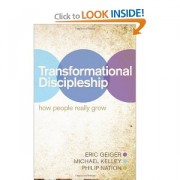Recently I received my copy of “Transformational Discipleship: How People Really Grow” written by my friends Eric Geiger, Philip Nation and Michael Kelley. I was curious about their work, because I believe discipleship is a current weakness overall in the church. How can we do it better? I decided to interview the three Kingdom builders.
Here is my interview on Transformational Discipleship:
Why do you feel strongly about this particular discipleship message?
(Eric) First and foremost, because “making disciples” is the calling laid on the life of the Christian. It’s what we are all supposed to be about, both as a disciple and as one participating in the process of discipling others. Of all the things Jesus might have said when He ascended into heaven, His marching orders to the church involved making disciples. But many of us choose to settle for behavioral modification or the transfer of intellectual knowledge rather than seeking and trusting the Holy Spirit to change people at their core.
(Philip) The charge of making disciples isn’t a passive one. God has called us in the church to take an active role in both our own discipleship and in the discipleship of those around us. It’s a process that we’re all on – as Billie Hanks has said, “I’ve never met a mature Christian, only maturing Christians.” We want to help people move into that journey for their own sake and for the sake of those around them.
(Michael) This particular message about discipleship is helpful, I think, because we are attempting to articulate the balance between doing and believing. We want to embrace that ultimately only the Holy Spirit can transform an individual. It’s His work, and yet we are to play an active role in that work. While we don’t transform ourselves or anyone else, we can try and create an environment, in our lives and our churches, that is ready to embrace the work of the Spirit.
Let’s address the title of the book. Why is the book called Transformational Discipleship?
(Eric) Each of the words in the title is significant. Every person in the world is a disciple because everyone follows someone or something. That’s what a disciple is – a follower. But while every person is a disciple, not every person is transformed.
What we are really after as followers of Christ is transformation. That’s the process in which something actually becomes something else. So growing in Christ isn’t just putting on a new set of habits or behaving differently; it’s deeper than that.
Being a disciple is simply following Jesus to a greater and greater degree. And if we are following Him, then we are through our lives becoming something different. The Holy Spirit and He alone does this transforming work in the hearts of people. What our job is, as church leaders, isn’t to transform; it’s to set the conditions that are most conducive for real transformation to occur.
(Michael) In the book, we liken this kind of partnership to water skiing. The person behind the boat isn’t the one who lifts himself of the water or pulls him across the lake. The boat has all of the power. But the one with the skies on does play a part. He or she must place themselves in the right posture behind the boat, giving the one driving the boat a “thumbs up” sign, and prepare for the ride.
Spiritual transformation is the same. God is the one enabling His people to mature and grow while His people are invited to place themselves in the right posture.
The subtitle is How People Really Grow. So in a nutshell, how does that growth happen?
(Eric) We frame the process of spiritual growth in the book through three circles: Truth, Posture and Leaders. The place where those three circles converge is what we call the transformational sweet spot.
The sweet spot on a bat or a tennis racket is the place that has the most potential impact when you hit the ball. In the same way, when these three factors come together a church is set up to experience transformational discipleship.
Here’s how we articulate those three factors coming together: The transformational sweet spot is the intersection of truth given by healthy leaders when someone is in a vulnerable posture.
Unpack that definition a bit. Each of those words (truth, leaders, posture) are big terms. What specifically do you mean by them?
(Philip) In each of the three areas, we highlight specific ideas that aid transformation to occur. We call them lenses. So for truth, there are three specific lenses that contribute to transformation: the gospel, identity, and the spiritual disciplines.
It’s especially important for leaders to understand these lenses because they influence the way they present God’s truth to the people that have been entrusted to their care. For a leader, then, to present the truth, they focus on the gospel, understand that in the gospel a person’s identity is made new and different in Christ, and equip their people to participate in the spiritual disciplines.
You say that truth should be applied by healthy leaders to people in a vulnerable posture. What makes a person have a vulnerable posture?
(Michael) All kinds of things. It could be a significant life change or a period of loss. It could be a conscious choice on someone’s part to orient life around learning and obedience. In the book, we describe three characteristics of someone in this kind of vulnerable, or teachable, posture: Such a person is aware of their weakness, interdependent on others, and has an outward focus.
This section was really personal for each of us because we all looked back and knew that there were certain parts of our lives when we were most receptive to the truth of God. Most of those times coincided with some tough life event that pushed us into that posture. That’s one of the reasons why healthy leaders are so important; they are able to be a stabilizing influence in the lives of their people, helping them see how God’s truth meets them in their time of need.
Tell us a bit about the research that’s outlined in the book.
(Philip) In 2010, LifeWay Research embarked on an ambitious research project. We surveyed believers about their spiritual lives and level of maturity. We wanted to look into the major arenas of life where spiritual maturity takes place.
The research was done in three phases. First, we did a qualitative survey of experts in the field of discipleship. Members of our research team did interviews with recognized experts from multiple countries including pastors, professors, and church leaders from a variety of backgrounds.
From these experts in the field of discipleship, our research team gained a better understanding of what is taking place in the church both domestically and in other countries (specifically in the Hispanic context).
After the expert interview phase, the research team also conducted survey of 1,000 Protestant pastors in North America. The survey delved into the type of discipleship ministries being used in churches and the satisfaction level that they have with them. The survey revealed a great deal of paradoxes occurring between pastors’ hope that people are maturing and the level of satisfaction they have that believers truly are maturing.
Finally, the team at LifeWay Research did a survey of 4,000 Protestant Christians in North America. Of that number, approximately 1,100 were in Canada and the survey was done in three languages: English, Spanish, and French.
It was a really extensive project, and we’re excited to frame the results in this book.
Is this a research driven project?
(Eric) Yes and no. It’s certainly a project that’s supported by research, but we didn’t want it to read like a pure research book. We wanted it to be accessible for pastors and church leaders of all kinds. So while you’ll clearly see the research in the book, it’s driven more by biblical truth.
What role does the church play in transformational discipleship?
(Michael) If you look at the transformational sweet spot, you’ll see there are three major components: truth, posture, and leaders. Truth comes from God and is brought out in His word. The posture piece relates to the individual disciple. But the leader is the one who brings those two things together. Take out any of those three pieces and you get a deficiency in discipleship.
Transformational discipleship most effectively happens in the context of the local church. The church shouldn’t be an “add on” to someone growing in Christ, but instead the relationships between members of the church are the context in which this transformation happens.
(Philip) While it’s certainly not happening everywhere, the research that led to Transformational Discipleship gave us a lot of hope. Leaders in the church understand that their chief role is to involve themselves deeply in this process. The church can’t be a place where intellectual knowledge is transferred; neither can it be a place where behaviors are merely modified. Neither of those things is transformation. Real transformation is not just doing or knowing something different; it’s being something different. It’s an incredible privilege to be a church leader and be deeply involved in this work of the Holy Spirit.
You emphasize early on in the book that this statement of the transformational sweet spot isn’t a formula or a model but a framework. Why is that?
(Eric) When I co-authored Simple Church, it was meant to challenge leaders to have a process for discipleship, but it was never intended to be a model (the first paragraph of the book read, “this is not a model”). But for the last five years many church leaders treated the book as a “new model” for church ministry.
We love prescription. But you can’t “prescribe” the work of the Holy Spirit. You can describe His work, based on the biblical evidence and the stories we’ve heard, but you can’t simply put in a model and expect the Holy Spirit to just fall in line.
(Michael) We don’t want anyone to treat the transformational framework in the book as a new mission statement; we want it to help people understand to a greater degree how people mature in the church. When we start to see how leaders, truth, and posture intersect, it changes the way we teach, program, develop leaders, and even do pastoral care. But it doesn’t eliminate the need to listen to the voice of the Spirit to see how those things will change in one particular local church.
Again, that’s the divine/human partnership at work.
What are you hoping is accomplished through Transformational Discipleship?
(Philip) I’m praying that Transformational Discipleship will fill the church with hope. The good news is that the Holy Spirit is most definitely at work transforming the hearts of Christians. What we want to do in the book is reaffirm His work and try to give leaders some very helpful footholds – some ways of thinking that can inform and shape their ministries for the years to come.
(Michael) Discipleship is a big word to a lot of people. It’s intimidating, and while there is something mysterious about the way the Spirit works in the hearts of God’s people, discipleship isn’t reserved for some special class of Christians. So my hope is that through the book, the way people really grow in Christ might be de-mystified a bit. Not in the sense that we lessen the emphasis on the work of the Spirit, but in the sense that the way this happens becomes simplified in our minds.
(Eric) I want the church to enter into a day of playing offense rather than defense. The human heart isn’t something pure that needs to be protected; it’s something wicked that needs to be transformed. Jesus wants us to be on the move – to play offense. To take ground for the kingdom in confidence because of who He is. So my prayer is that the book helps us to see how we can be active partners with God to see people truly grow deep in Jesus.
What are your thoughts on discipleship in the church today? How are we doing?








Discipleship is something the church really struggles with. I've seen us go for the "save" over going for "discipleship."
A lot of it has to do with the time commitment of having disciples. You must be committed and taking an active role in their lives. Too many people unwilling to do that.
I agree Joe
As you know, the Reveal Study done by Willowcreek showed that church attendance did not predict spiritual vibrancy. What did you find about that?
Josh Hunt
Hey Josh – two things: First, Willow Creek used a sampling only from the churches in their association and we at LifeWay Research used a random sampling of Protestants in North America. Therefore, any conclusions drawn need to be applied in like fashion.
Secondly, we did find that higher frequency of church attendance increased the "score" on spiritual maturity. This applied to both the categories of "church attendance" and attending a small group. In the coming days, LifeWay Research will release the specific data around this idea.
Pastor Ron! Thanks for the interview message today. Thart was wonderful. If a layman looks into the ministry of Jesus, he would simply point out to the nurturing of discipleship with his 12 followers.
As it is written, today many young people yearn for discipleship. Even in the corporate world, today mnay look eagerly for mentors. I strongly believe that it is through this discipleship/ mentoring we would be able to develop new generation God fearing leaders.
Thanks Uma. I agree.